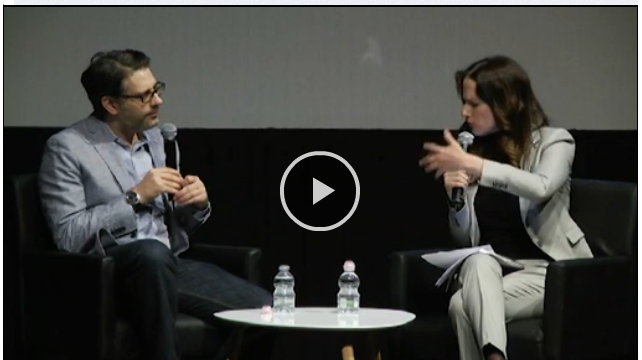The BBC’s director of television Danny Cohen attended a conference on the topic of comedy as a vehicle for social change in Jerusalem on December 21st. His interview with Channel 2 news anchor Yonit Levi made headlines in Israel because of what Cohen had to say about antisemitism in Europe.

“I’ve never felt so uncomfortable being a Jew in the UK as I’ve felt in the last 12 months. And it’s made me think about, you know, is it our long-term home, actually. Because you feel it. I’ve felt it in a way I’ve never felt before actually”. […]
“And you’ve seen the number of attacks rise. You’ve seen murders in France. You’ve seen murders in Belgium. It’s been pretty grim actually. And having lived all my life in the UK, I’ve never felt as I do now about anti-Semitism in Europe.”
The context to those statements can be appreciated in the full interview (in English), available here with the relevant section appearing at around 18:49. A little earlier – at around 16:00 – Levi raises the subject of BBC bias against Israel and the corporation’s recent reporting of Operation Protective Edge which she describes as having been handled as reporting on a humanitarian crisis in Gaza, divorced from the context of Hamas missile fire on Israel. She gets the standard answer to the effect that ‘we annoy both sides so we must be doing it right’.
Cohen: “Does the BBC get every news report, every minute and every second of the thousands of hours of content we produce every year absolutely right? No. No broadcasting organization in the world would. Do the teams work hard to maintain their objectivity? I’d say yes. Are we perfect? No.”
Danny Cohen is of course not personally responsible for BBC News. If he can get past corporate loyalty, platitudes and sound-bites, he is however in a position to help those who are to understand the connection between inaccurate and partial BBC reporting of both Middle East and domestic events, the manner in which those stories are framed, the BBC’s tolerance of antisemitism on its own comments boards, and the atmosphere on the streets of Europe which he clearly and justifiably finds so worrying.
After all, as his wife noted whilst writing about antisemitism even before the summer conflict between Israel and terrorist organisations in the Gaza Strip:
“Jews in Europe now face a three-pronged attack. […] First, from the far right, for whom antisemitism is a long-established part of their manifesto. Second, from the liberal left, whose often knee-jerk anti-Zionism serves to fan the flames of antisemitism, all too frequently expressing its hostility to Israel in language and imagery traditionally deployed to attack Jews. […]
But fighting antisemitism cannot just be a top-down initiative. Each of us has to take responsibility for this project. This means being mindful about language and the imagery we accept. […] It means being careful to keep criticism against Israel fair and legitimate – evidence based, politically balanced and absent of racial overtones – so that it doesn’t demonise Jews. It means understanding our own latent biases, so that we can consciously address them.”
And whilst we are on the topics of comedy, language, imagery and antisemitism, it is worth remembering that this programme aimed at 16 to 24 year-olds was broadcast on Danny Cohen’s watch.
Related Articles:
How did BBC News cover this summer’s anti-Israel demonstrations in the UK?
BBC Breakfast’s Jenny Hill enables PSC antisemitism washing
BBC News website coverage of Operation Protective Edge: part five




